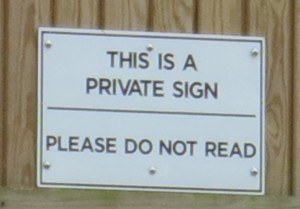Sarcasm – the lowest form of wit. Or is it?
Recent research tells us that it takes more brainpower and skill to interpret the social cues and intention behind sarcasm. So whether we’re using it or listening to it, you can’t truthfully say that it’s the lowest form of wit after all!
In fact, because processing this form of language requires more of your intellect to correctly navigate your way between the literal and the intended meaning of the words, no longer getting the joke, may actually be a sign of early dementia.
People with autism often struggle to interpret the meaning behind the words, which they are more likely to take literally. Though a few months of training can help autistic children not only understand irony, but enjoy using it too.
So what’s the attraction do you suppose? Why do we love to say one thing and mean something else entirely?
Well, some evolutionary psychologists suspect that it allows us to test our friends. We want to know that they have a similar level of intelligence and connection. Some believe it allows us to criticise each other without being obviously hostile.
Believe it or not, research coming out of Israel has found that a little sarcasm usually improves the outcome when we’re making a complaint at Customer Services.
For many, of course, it’s a simple way to create humour…I have to admit, that surprises me! Do you find that you get a better result that way? Leave me a comment – I’d love to know.
Here’s a review on Amazon for A Million Random Digits, by Michael D. Rich:
“Such a terrific reference work! But with so many terrific random digits, it’s a shame they didn’t sort them, to make it easier to find the one you’re looking for.”
Have you seen the hilarious review of ‘Male Testicular Exam Model Anatomy’? It has realistic tumors built-in as it’s a teaching aid, training people how to feel for and identify potentially life-threatening changes:
“Finally, a rubber scrotum that I can use for exam training purposes. My room mate was going “nuts” (pardon the pun) because I kept trying to use his. I wish he wasn’t such a light sleeper. Oh well.”
And my favourite – because it’s local – and Nige spotted it as we were cycling along the river recently. It’s on the outside of the very seriously fortressed and security-mad riverside property of Uri Geller (known for his psychic spying for the CIA and more famously, and arguably more usefully (did you like what I did there?) for bending spoons.)
Joking apart, intended meaning is more easily misinterpreted to hilarious or sometimes relationship-damaging effect in the written word (emails, Twitter, Facebook, etc, etc, etc), probably because you can’t pick up non-verbal cues when you’re not face-to-face with someone.
You’d have thought, consequently, that we’d value a little electronic help, wouldn’t you?
But it’s widely considered, that recent and fairly successful attempts to create sarcasm-detecting machines, take all the fun out of working it out for yourself!
Perhaps, at least in this case, as Beverly Sills, the operatic soprano would say, “There are no shortcuts to any place worth going.”



